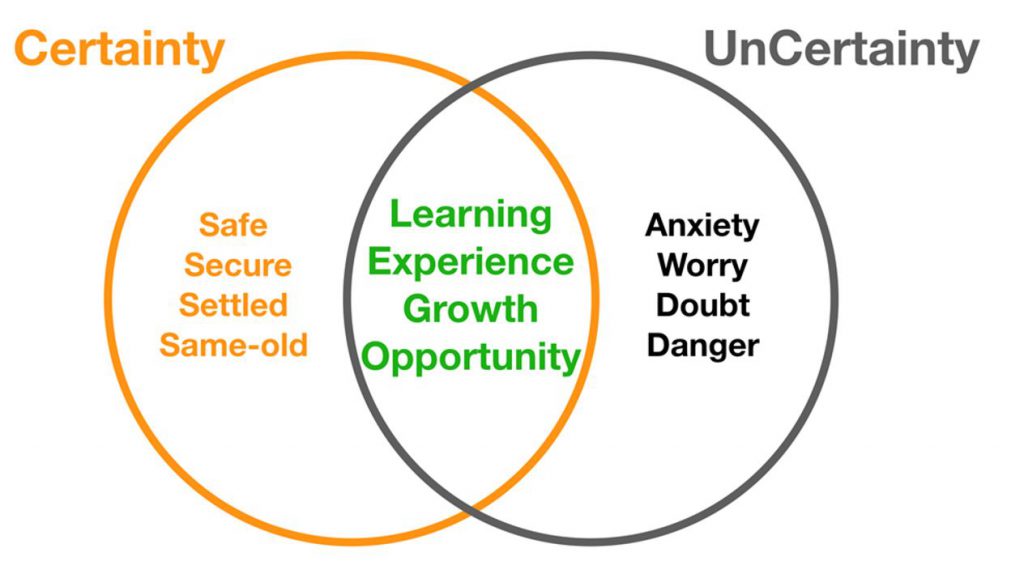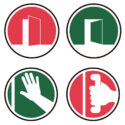
If we stay in certainty too long, we become bored explains Jason Liem
When we feel our lives are inside out and upside down, we crave certainty. There is an inner urge for us to acquire a richer and more detailed map of the terrain. The clearer the map the more confident we are to make decisions and to move forward into the landscape.
From an evolutionary perspective the human drive to increase certainty meant a greater chance of survival. It meant security and safety. Uncertainty was where danger and, potentially, death lurked.
From a modern perspective, especially if you live in the West, life-threatening instances are very few and far between. Still, this does not dampen our innate urge to seek the shelter of certainty.
Consider for a moment a person who you know is successful. Perhaps you yourself come to mind. When you first started out in your chosen career or direction in life the road was littered with questions marks of all sizes. Although it all seemed daunting you pushed onwards into uncertainty. Self-doubt seeped into your thinking, but you pushed it aside and moved forward.
To achieve a level of success a person needs to venture outside of their comfort zone. We come to an agreement with ourselves: to grow and develop we will need to sacrifice a degree of certainty and to embrace a level of risk.
Achieving Success
There comes a point where the successful person has achieved their goals – a level of income; a rank in an organisation; a feeling of independence; a member in an elite group or clique; a home in the right neighbourhood etc. When he/she reaches their goals the road ahead seems much more certain, perhaps so certain that they can clearly see it stretching kilometres and years in front of them.
If someone worked with the same organisation for the last 15 to 20 years, maybe even longer, what do you think the odds are that she’ll move to another company? If someone toiled for years to gain expertise how likely is it he’ll jump ship to try something new?
Perhaps the job no longer challenges me and it has become routine. The emotions I feel at work are a mixture of dispassion and boredom. On the other hand, I have a good and steady income. I’m intimately acquainted with my responsibilities, field of knowledge, working network and skill sets. Would I want to give up all that certainty?
Unless I’m cognisant to set new goals, I will grow very comfortable in the certainty I’ve achieved. My hunger for growing and learning will dissipate, and I’ll grow complacent. I’ll opt for certainty over uncertainty. I’ll settle.
We stay locked behind the confines of certainty that we’ve built for ourselves to stave off uncertainty. We build the walls tall and strong and fear anything outside of their perimeter.
This is the modern paradox of certainty: the drive that once kept us alive can be the very same thing that keeps us from living.
Growth is Uncertainty
You will either step forward into growth or you will step back into safety.
Abraham Maslow
Certainty can feel like waking up under warm sheets on a cold winter morning. At first, it feels so cozy under the blankets. The feeling of placing your feet on a cold floor holds no appeal.
Some time passes and you notice a growing sense of restlessness seep into your muscles. One part of you compels you to jump out of the bed and face the day. Another part persuades you to relax and stay horizontal. I think many of us can relate to this internal debate.
Uncertainty is the domain of new experiences. It is the home of opportunity. It is where we grow, develop and learn. Uncertainty is about the future. It is about moving further down the unexplored road with discovery and curiosity as travelling companions.
Certainty is where we do what we have always done. There is no learning. We are stuck travelling back and forth along well-worn and familiar routes. Instead of discovering new roads we choose to stick to the old neighbourhood. Routine and complacency are along for the ride. The conversations hover around the good old days. It doesn’t take much for these discussions to grow tiresome and stale.
If we stay in certainty too long, we become bored. We feel the restlessness to get up and go. If it’s something as simple as sitting on a park bench for too long, it’s easy to move on.
It’s not so simple when it is things like a relationship, a job, our health.
Irrespective of how simple or complex the thing is there is still the urge that nudges us to do something about it. And the longer we wait the stronger it gets.
Every morning the urge diligently knocks on our door and encourages us to come out and play. “Come on out! Let’s explore, learn and grow!” the urge compels. We’ve grown accustomed to ignoring the knocks and pretending we aren’t at home. We tell ourselves the urge will be back tomorrow morning and maybe then I’ll answer the door.
One morning we don’t hear the knock anymore and realise too many years have gone by.

It’s too late. We are left sitting behind the safety of our locked door with only regrets and what-ifs sounding in our ear.
Timing is Not Everything
Have you ever found yourself putting things off to another day? You conveniently tell yourself that tomorrow you’ll be in a better mood or your energy levels will be higher, or you’ll have more time. You’re trawling your mind for any excuse that will justify your inaction.
If you are waiting for the right moment to present itself then I think you are going to be waiting a long time. From my experience, the odds of the right moment showing up are astronomical. Sometimes we need to choose to create the moment in which to act.
Our thoughts and actions may not align. We may feel an internal value clash between staying put and moving forward. This means we need to be bold and make a choice. No more hedging our bets. We are going to have to make trade-offs and it’s going to feel uncomfortable. We can wish all we want that circumstances were different. It may be far from ideal, but it is the reality we are facing.
Any one of us can create the drama in our head that the situation is not fair. And yes, maybe it is unfair, but the situation is what it is. The question is, what are you willing to do about it?
Wanting Versus Willing
There is a difference between wanting and willing.
You may want a new career, but are you willing to go back to school to get the needed qualifications? Do you want a higher salary, but are you willing to step up and ask for it? Do you want to run your own business, but are you willing to accept the risk and strive for it? You may want a promotion at work, but are you willing to be bold and ask for it?
What I am about to propose is quite controversial, but if you really think about it there is a stickiness to its truth.
The reason people feel stuck where they are is because they’ve not made the choice to change their circumstances. People who have been stuck for a long period and still talk about wanting to change, at some level like where they are. Deep down they really don’t want to change. They are only paying tribute to the idea.
If someone truly desired change in their life, don’t you think they would have done something about it? I can confidently answer yes to this.
I’ve worked with people for over two decades across cultures, genders and social hierarchies. Those who really desire change act on those desires. Those actions may be small and incremental, but they are steps forward nonetheless. They accept there is a degree of risk and move into uncertainty, even with trepidation and doubt in tow.
These bold individuals give up their crutches about their social background, upbringing, disabilities, disadvantages, history etc. They understand their circumstances are far from ideal, and yet they choose to act and deal with their current reality to improve their life situation.
They don’t ask themselves what they want or don’t want. Rather they ask what they are willing or nor willing to accept anymore. When we ask and answer these questions our true desires and goals come to light. It becomes so much easier than to make choices that move us in the right direction.
Aligning Thought with Action
An idea not coupled with action will never get any bigger than the brain cell it occupied.
Arnold Glasow
Do you feel this restlessness for something new and novel? Maybe an urge for just a small change? Perhaps the inclination for some professional development or personal growth?
Many of us invest some thought into changing things up in our lives. We entertain the idea, but there always seem to be other pressing matters to attend to. So, we shelve the thoughts and promise ourselves to do something about them when we have more time. We go through the motions, but very seldom do we translate thought into action.
Congratulations to you if you are part of the small percentage of people who have acted on a thought and have instigated a desired change in your life. There is still hope for those of us who have paid homage to the idea but have never executed it.
Take a moment and think about someone you highly respect. It could be a famous figure in the present or they might be historical. Perhaps it is someone you personally know. Now ask yourself why it is you respect them.
When I pose this question to my clients the answers fall along the line of: “It’s what he/she achieved”; “It is what they managed to accomplish”; “It’s what they did!”; and a dozen other permutations of this answer.
Our respect for people is defined by what they did and not about what they were thinking of doing. It is in this gap between the thinking of doing and the doing that separates the bold from those who want to be bold.
We respect those people because they have chosen to act on their thoughts. They acted to move into uncertainty and to face risk. They chose to learn, grow and develop, which meant they were willing to accept falling down, messing up, failing and making mistakes.
When we look to those we respect, we wish we had their courage and confidence to move into uncertainty to achieve what they’ve achieved. The truth is they were plagued by thoughts of doubt and uncertainty just like you or me. Their brains generated negative thoughts that convinced them to stay in their comfort zone and not to stretch.
The big difference is they learned not to entertain every negative thought that popped into their heads. They took ownership of their dysfunctional thinking and learned to ignore it. I am quite sure for many of them that was a hard-earned lesson. That kind of insight is something that has to be experienced multiple of times before its benefits sink in.
Our Reality is Shaped by Action
Reality is shaped not by our thoughts but by our actions. We become who we are by the actions we take.
Cognitive behavioural psychology has two main premises. One premise is that we can change our behaviour by changing our thoughts. The other premise is that we can change our thoughts by changing our behaviour.
I have found the latter to be advantageous when a client is stubbornly entrenched in a certain way of thinking. Sometimes intellectualising a solution leads to nowhere. It becomes an act of futility. The conversation is circular, and you end right back where you started.
This is when experience becomes the best teacher. It’s in the act of doing that we learn what works and what doesn’t. It is the outcome of an action that leads us to question the validity of our thoughts and to grow our confidence.
Experience allows us to learn and reassess our beliefs about what is doable and what isn’t. It helps us to see the gap between how we think life should be and how it is. When we are cognisant of this gap we start to think more objectively about our relationship with certainty and uncertainty.
We all need a sense of certainty in our lives. It provides a sense of stability and consistency. Certainty grants us a level of clarity, which in turn grows our confidence. As our confidence surges it becomes the springboard that launches us to extend our reach into new areas of exploration. It provides us with the impetus to move from thinking about doing something to doing it. By pushing the boundaries of our skills, knowledge and experiences we learn, grow and develop.
As I stated earlier, if we are not aware of the overpowering allure of certainty it can lead us to live lives of stagnation. We become so enamoured with the idea of safety and security that we retreat deep behind the fortified walls of certainty and grow complacent and settled in our ways.
We convince ourselves to fear uncertainty. Our unfounded biases harden. We go through the same tired motions as our days tick away and we forget that opportunity lies beyond the gates of certainty.
Unless we waken ourselves to the paradox of certainty, the drive that once kept us alive can be the very same one that keeps us from living.













